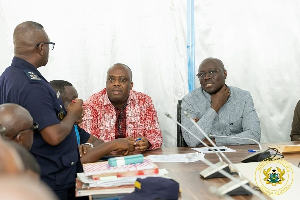A look at the above national patriotic song (sorry am unable to complete, please help) speaks volumes of what has transpired in our beloved motherland till now. I petition the authorities that this song be sung in the parliament before every sitting after prayers, then also in all institutions of training and offices. Constantly reminding ourselves of the faithful services of others is one sure way of inspiring all to noble heights. Similarly, all will be mindful of what greed, selfishness and the like can and do result in. The Emergent Ghana is for all to contribute towards the nation we all desire through selfless service. The potential to build our dream country abounds. It might not be that simple but the journey of a thousand miles begins with a step. We have to reprioritize our goals as a people and engage all in building our motherland. Then also make our leaders and managers to understand that they are put in positions for the people and not vice versa.
The exploitation of Ghanaians is very much perpetuated by financial institutions, the banks, insurance firms, stockbrokerage firms and lately money transfer agencies. These have been milking on the seemingly powerless and ignorant citizen. We appreciate that they were established for profit making. But it?s amoral to use the knowledge and power to take advantage of the people they are purported to be serving. In Ghana, the banks set the minimum amount one has to have in a savings account to maintain it. Who owns the money and has the right to spend? Meanwhile this said amount does not attract any interest. In the issue of interest, the banks pay about 13% interest per annum on savings and take twice as much on loans contracted. If the people do not save who suffers? The banks need to appreciate that, in serving more people you make more wealth. Recently, Prof. Adei (GIMPA) discoursed the irrationality of saving with the bank in Ghana. Presently the banks really strangle the ordinary Ghanaian. The less talked about running current accounts, withdrawals and transfer charges the better. In the money transfer market, they cannot give you the foreign exchange if you have to send money outside Ghana. One will have to buy his/her own from the black-market or other foreign exchange bureaus, before they will effect the transfer. On the other hand remittances sent to Ghana are paid in cedis at the rate they choose to pay. What style of business is that? They have to be fair to the people of Ghana. Doesn?t this contribute to hikes in foreign currencies? The Emergent Ghana considers about 13% per annum interest on savings and about 18% per annum on loans a fairer deal. No foreign currency is used in Ghana, its better they let go the strong hold to facilitate free trade. More wealth is created as money is freely allowed in circulation in the economy. The painful thing is that some of these are not policies of the bank per se, but serve the wanton greediness of some managers. However, if they are bank policies, then it?s very unfortunate. Our banks will have to be humane in its true sense in dealing with all Ghanaians. The government must not only bemoan the situation, but formulate concrete legislative instruments to salvage its people.
The era where issues affecting our people seemed not to be of importance must go; every Ghanaian?s issue is important. Government is about providing and protecting a people. A government is good if it is able to protect its helpless and ignorant citizenry. The banks will have to attend with delight, services to the Ghanaian civil servant and the Ghanaian farmer. Services to students will have to attract moderate charges. It?s an eye-sore for the extra charge parents incur presently in paying fees of their wards in second cycle institutions. It is possible to have automated systems to pay services without delay, and make banking simpler and faster. Presently their charges are high and services unacceptable. Their preoccupation must be improved, cheaper service to the people.
The Emergent Ghana is for banking to be affordable and accessible. It is appalling for a Ghanaian to look carefully into our insurance sector. It is more of cashing on the Ghanaian than the purpose of remedying in the event of accident. I had waited for the Social Security and National Insurance Trust (SSNIT) to make public its transactions in a year and it has never happened. If the Ghanaian civil servant pays into SSNIT, he/she has a right to knowing how the money is being invested. Practically what we have observed over the years is that Ghanaians contribute from their meager monthly income for the managers to feed fat. The people who manage the contributions are better off in all things than those who really own the wealth. In the past one financial loss after the other has been in the media about SSNIT investments, wasting contributors? money. Thereafter, they institute wicked schemes, not beneficial enough to the contributors.
Amidst all their noise about CAP 30 not being sustainable, will they make public all that is spent on the management in a month on accommodation, transport and fuel alongside utility bills and traveling allowances? And what of their retirement benefits as has become popular with our management or leadership class. In the Emergent Ghana, we are talking of empowering contributors? to regular briefing on their investments and foremost consideration on issues of their interest. It is painful that majority of the contributors do not have access to the SSNIT housing scheme. Unless it is substantially more profitable to lease out, than enjoy oneself, there is no wisdom in selling SSNIT flats to non-contributors. The lengthy protocol in the case of private insurance firms in the event of an accident or a maturity is enough to put anyone off. The laws are unfriendly, and mostly selfishly motivated. In Ghana, our insurers only stand to benefit, contributors scarcely gain. Even after years of contribution without any accident in the case of motor vehicles, there are no incentives, practically no rebate. It is astonishing that when one has to start an insurance scheme and payment, one has practically no contact with legal practioners but to claim, one has to contract one at the persons own cost. The present government is doing well with the introduction of tax relief?s for tax payers who qualify. Our insurance firms can do likewise without any lengthy legalities to make insurance schemes attractive.
Stockbrokerage firms also are not helping Ghanaians who decide to invest in stock market. The managers of the shares have the power to decide on what they will take before considering the interest of the owners, inconsiderate of whether the shares are performing or not. The owners of the shares are virtually powerless. The Emergent Ghana seeks legislative instruments to protect the interests of its populace in their dealings with financial institutions and not to leave them at their mercy. The Emergent Ghana is about sound and fair financial practices for the good of all.
There is a lot of money in circulation but the present poor show or services from financial institutions make it unattractive to many entrepreneurs. Would financial institutions explain why most Ghanaians find it more lucrative to invest in traveling outside the country than invest in available financial instruments?
To be continued.















